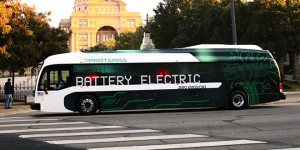 With all the focus on electric cars, it’s easy to overlook the impressive success that electric buses are having. The buses are more expensive than traditional diesel-powered buses (typically at about $700,000), but they have minimal operating costs due to low maintenance and relatively cheap electricity as fuel. As a result, they already present a strong value proposition to transit agencies.
With all the focus on electric cars, it’s easy to overlook the impressive success that electric buses are having. The buses are more expensive than traditional diesel-powered buses (typically at about $700,000), but they have minimal operating costs due to low maintenance and relatively cheap electricity as fuel. As a result, they already present a strong value proposition to transit agencies.
Electric buses also offer a significant environmental upside, both on carbon pollution and conventional air pollutants, as E&E News reported [paywalled]:
Converting the entire U.S. fleet of diesel transit buses — around 40,000 vehicles — to electric could avoid 2 million tons of greenhouse gas emissions each year, according to a recent report by Environment America, U.S. PIRG and the Frontier Group.
As transit agencies seek to retire old diesel buses, they are increasingly turning to zero-emissions technology, determining that it’s cheaper in the long run and provides significant public health benefits. Boesel estimates that around 5 percent of new U.S. bus sales are electric right now. Around 1 percent of new car sales are electric.
So not only are electric bus sales outperforming electric passenger vehicle sales right now, they are projected to dominate in the near future. Bloomberg New Energy Finance forcecasted electric buses to constitute 84% of new bus sales around the world by 2030, compared to 28% of new passenger vehicle sales by that same year.
We’ll be hosting the chief executives of two of the leading electric bus companies, Proterra and BYD, at our upcoming June 8th conference at UCLA on zero-emission freight at Southern California’s ports. Register now to hear more from them, as space is limited.
I often feel that hard core transit advocates deep down hate electric vehicles. I’ve heard comments to that effect, that EVs are just a shiny new product to justify avoiding building new urban environments and encouraging people to walk, bike, or take transit. Plus, many transit advocates simply hate cars, for the danger they pose to pedestrians and bikers, the physical distance they put between people and divide communities, and the environmental destruction they cause by enabling sprawl and polluting the skies.
 But as someone focused on greenhouse gas reduction, I am a big EV booster. It won’t solve everything, but we need to switch out of petroleum and to bring more investment in battery technologies, which EVs provide. It’s just not realistic to think that everyone can move into an urban, non-automobile environment or that we can entirely retrofit our car-centric built environment in time to avoid climate catastrophe.
But as someone focused on greenhouse gas reduction, I am a big EV booster. It won’t solve everything, but we need to switch out of petroleum and to bring more investment in battery technologies, which EVs provide. It’s just not realistic to think that everyone can move into an urban, non-automobile environment or that we can entirely retrofit our car-centric built environment in time to avoid climate catastrophe.
So for all the EV haters who love transit, maybe they will love Proterra’s new 180-mile range electric bus:
The extended-range Catalyst XR is available in configurations carrying between 129 kWh and 321 kWh of energy storage, and can be recharged in a little over an hour.
“Operating successfully in cities across the country, the Proterra Catalyst is the most energy-efficient transit bus on the market,” said Proterra VP Matt Horton. “Adding extended-range capabilities to our existing portfolio of fast-charge products enables us to help our customers meet more of their most demanding service requirements. The flexibility of our platform allows our customers to more confidently invest in the future of transit.”
Who wouldn’t love a silent, clean and smooth-accelerating bus in their neighborhood? Plus, those batteries could be repurposed for bulk energy storage, while potentially charging at key times when renewable energy is at surplus. And perhaps most importantly, they pay for themselves pretty quickly through saved fuel costs, leaving more transit funds for other purposes.
This could be a kumbaya moment for EV and transit advocates.


